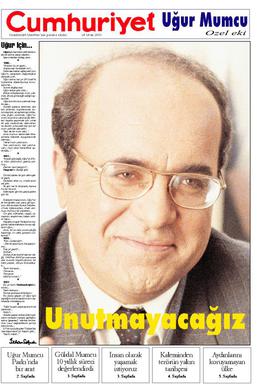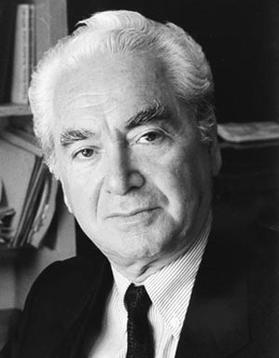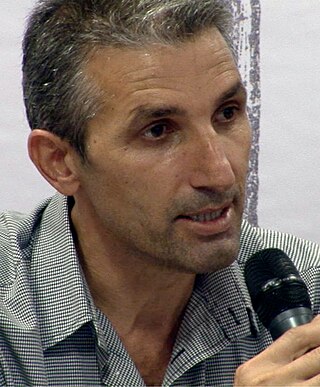Related Research Articles
Cumhuriyet is the oldest up-market Turkish daily newspaper. It has been described as "the most important independent public interest newspaper in contemporary Turkey". The newspaper was awarded the Freedom of Press Prize by Reporters Without Borders in 2015 and the Alternative Nobel Prize in 2016. It is considered Turkey's newspaper of record. It has been known for its stance of publishing anti-Islamist titles and news at least since the 1960s.

Yunus Nadi Abalıoğlu was a renowned Turkish journalist and the founder of the newspaper Cumhuriyet. He was known for his support for Turkish nationalism and his sympathies with the Nazi regime, publishing many antisemitic propaganda articles in praise of Adolf Hitler.

Uğur Mumcu was a Turkish investigative journalist for the daily Cumhuriyet. He was assassinated by a bomb placed in his car outside his home.

Muammer Aksoy was a Turkish lawyer, politician, columnist and intellectual who was assassinated.
Osman Mümtaz Soysal was a Turkish professor of constitutional law, political scientist, politician, human rights activist, ex-prisoner of conscience, senior advisor, columnist, and author.
Oya Baydar is a Turkish sociologist and writer. For a long time she was involved in socialist politics.

Nedim Şener is a Turkish writer and journalist who has written for the Milliyet and Posta newspapers. He has received a number of journalism awards, including the Turkish Journalists' Association Press Freedom Award, the International Press Institute's World Press Freedom Heroes award, and PEN Freedom of Expression Award. He is particularly known for his 2009 book on the assassination of Hrant Dink, which showed the role of Turkish security. He is under indictment in the Odatv case of the Ergenekon trials because, he believes, his 2009 book alleged that police officers responsible for the Ergenekon investigation were responsible for the Dink murder.
Akis (“echo”) was a former political periodical in Turkey. It was a 36-page weekly magazine somewhat resembling Time magazine. Its motto was "serious but not boring". There were sections on domestic news, foreign news, economy, culture and sometimes sports. Its target reader was the educated middle class readers. The articles were mainly focussed on the details of the events in a rather humurious tongue.
Yön was a weekly Turkish political magazine published between 1961 and 1967. It was a Kemalist and leftist magazine. In fact, Yön was more than a publication in that its contributors represented a political movement in the 1960s, Yön movement, which was a successor of the leftist-Kemalist movement in the 1930s known as Kadro movement. The latter also gathered around a publication, Kadro.
Doğan Avcıoğlu was a Turkish writer, journalist and politician.

The Ilhan Selçuk and the Enlightenment Instigators of the Republic Monument or, is a memorial outdoor sculpture commemorating journalist İlhan Selçuk (1925–2010) created by sculptor Mehmet Aksoy.
Yeni Dergi was a monthly cultural magazine which was published in Istanbul, Turkey, between 1964 and 1975. The magazine featured both translations and original texts from different fields.
Yurt ve Dünya was a sociological and political magazine which was headquartered first in Ankara and then in Istanbul, Turkey. It was first published in the period between 1941 and 1944 and then between 1977 and 1980. It is known for its well-known editors and contributors, including Sabahattin Ali, Niyazi Berkes, Behice Boran and Pertev Naili Boratav.

Şebnem Korur Fincancı is a Turkish medic, former professor, and current president of the Turkish Medical Association (TBB). She is an internationally renowned expert on human rights and a member of the Turkish Human Rights Association (TİHV). In Turkish popular culture she is being called to be the "Turkish female villain".
Birikim is a leftist magazine which has existed since 1975 in Turkey. It was banned by the military authorities in 1980 immediately after the coup. The magazine resumed its publication in 1989. It was a print magazine under the subtitle Aylık sosyalist kültür dergisi until 2005 when it was redesigned as an online publication.
Adımlar was a literary and political magazine which appeared in Ankara, Turkey, between May 1943 and April 1944. Its subtitle was Aylık Fikir ve Kültür Dergisi. It is known for its cofounder, owner and editor-in-chief Behice Boran, a Turkish socialist politician, and for its introduction of humanist approach towards literature in the country.
Forum was a biweekly political and cultural magazine which was published in Ankara, Turkey, between 1954 and 1970. The magazine is known for its opposition to the Democrat Party (DP) and its leading contributors. Its title was a reflection of its intend to be a publication for open debate about politics and culture.
Cemal Reşit Eyüpoğlu was a Turkish finance officer, lawyer, politician and journalist. He was a member of the Republican People's Party (CHP). He served at the Parliament from 1950 to 1954 and the Constituent Assembly in 1961. He was a leftist and Kemalist figure and cofounded some publications, including Yön and Devrim.
References
- 1 2 "Kemal Bisalman Kalbine yenildi". Hürriyet (in Turkish). İstanbul. 10 December 1999. Retrieved 14 September 2021.
- 1 2 3 4 5 6 7 8 Ayla Acar (2012). "A Review in Opposition in the Period 12th March (1971): Ortam". İletişim Fakültesi Dergisi (in Turkish) (42): 6–8.
- 1 2 Aydın Engin (25 January 2015). "Gülümseyen Gülümseten Uğur Mumcu". Cumhuriyet (in Turkish). Retrieved 14 September 2021.
- 1 2 "Parliament Documents" (PDF) (in Turkish). TBMM. 10 March 1972. Retrieved 14 September 2021.
- ↑ "Yeni Ortam'ın Patronu Gazeteyi Faşistlere Sattı" (PDF). Maden İş Dergisi (in Turkish) (71): 6. 1 March 1976. Archived from the original (PDF) on 14 September 2021.